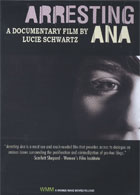Filmmaker: Amanda Homsi-Ottosson
Year: 2011
Country of Origin: UK, Lebanon
Format: Color, DVD
Running Time: 40 minutes
Languages: English, Arabic (subtitled)
This documentary from Lebanese director Amanda Homsi-Ottosson explores the controversy surrounding Jumanah Sallum Haddad’s magazine Jasad. Published quarterly, Jasad is an erotic cultural magazine that aims to educate and provide and outlet for Arab sexuality. Haddad, a writer herself, decided to create an outlet for other Arab men and women to read, write, and discuss arts and literature surrounding ideas of the body.
Contradiction mostly focuses on the debate that has sprung up around Jasad, both between those who view the magazine as beneficial and those who find it to be inappropriate and shameful and between those who believe that it is not serving women in the way it should be. The documentary focuses mainly on interviews with Haddad herself, those who read (or wish to ban) her magazine, and various professionals whose lives are touched by the issues in covered in Jasad, such as a sexual health counselor.
Contradictions paints an interesting portrait of Haddad and her magazine. The documentary begins with Haddad explaining why she was motivated to create Jasad and continues with street interviews about perceptions of the magazine. Reactions are predictably polarized, ranging from religious denunciations of the magazine to endorsements of the work by young men and women hoping to spread awareness and acceptance of sexuality.
The most interesting part of Contradiction comes when various Jasad readers explain the importance of having such a publication in the Arab world. It is explained that it is common for Arab men and women to use French or English words for genitalia and sex acts, because the most common equivalent words in Arabic are either offensive or nonexistent. Jasad is portrayed as bringing back ownership of not only the body but the language surrounding the body to Arabic speakers. The narrative of Jasad can be written as one of decolonization and reclamation.
Contradictions, although unconditionally supportive of Haddad and Jasad, does allow alternative opinions to be expressed through interviews. One in particular offered a valid and interesting critique of the magazine. Two Muslim feminists – one veiled and one not – argue that Jasad is pushing a certain kind of liberation on society. The women explain that there should be no shame in wearing a veil, and that they are “not represented in this ‘revolutionary magazine'”.
Related readings:
I Killed Scheherazade: Confessions of an Angry Arab Woman, by Jumanah Sallum Haddad, creator of Jasad

